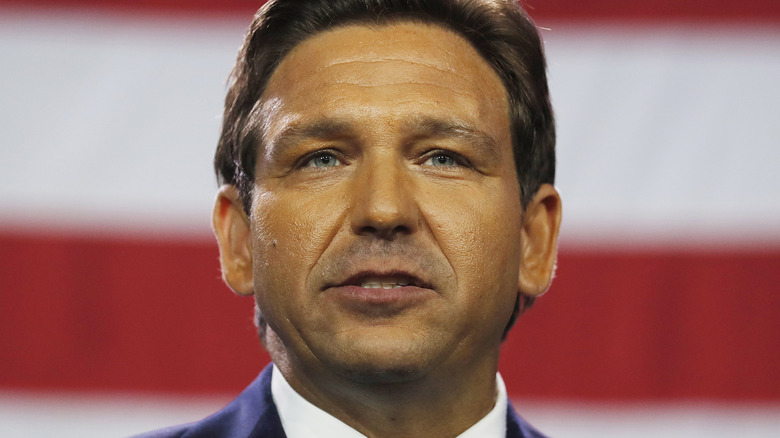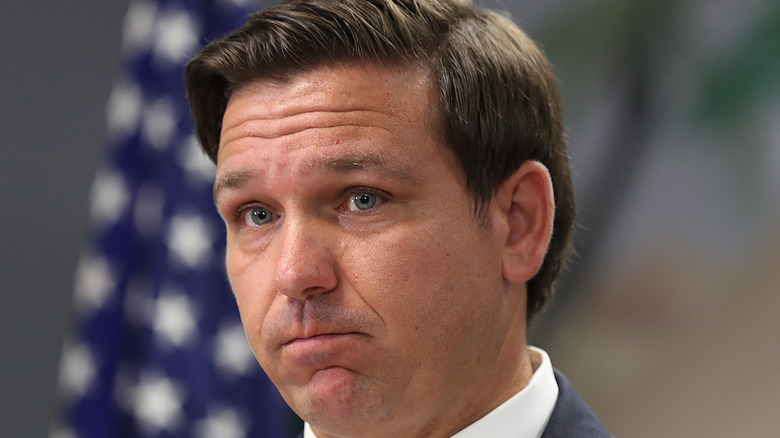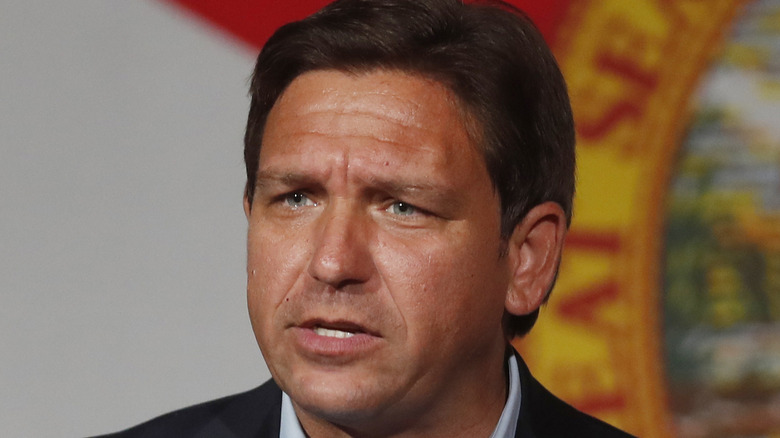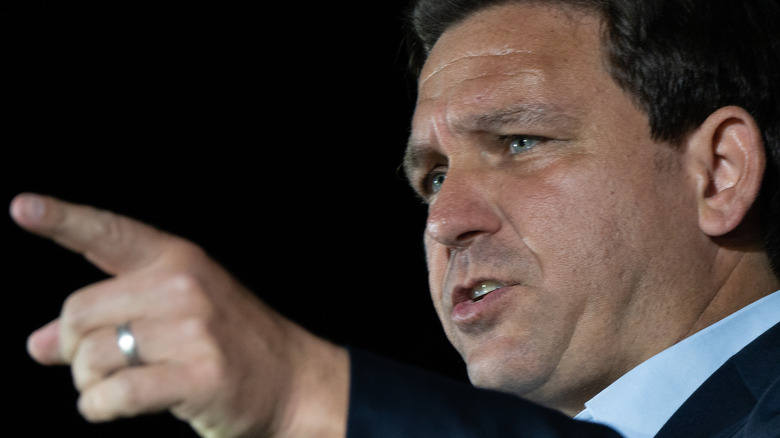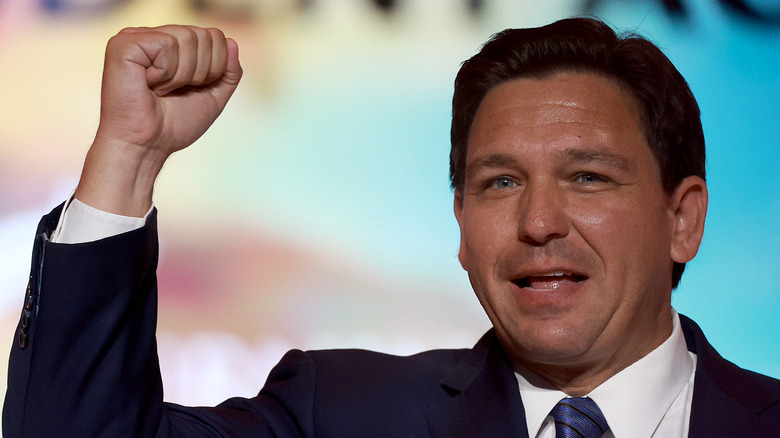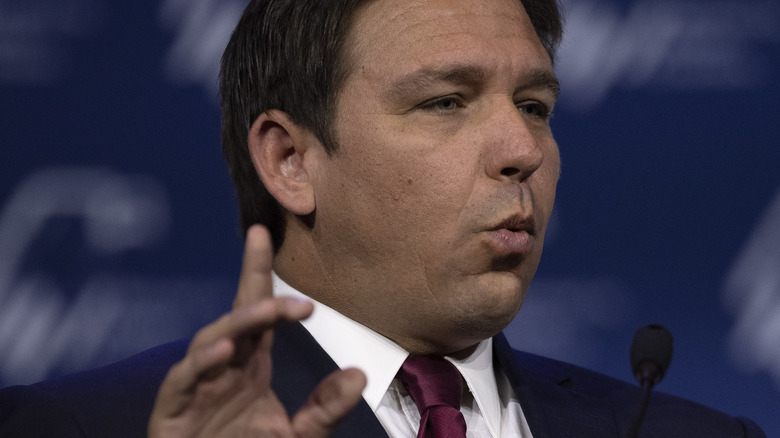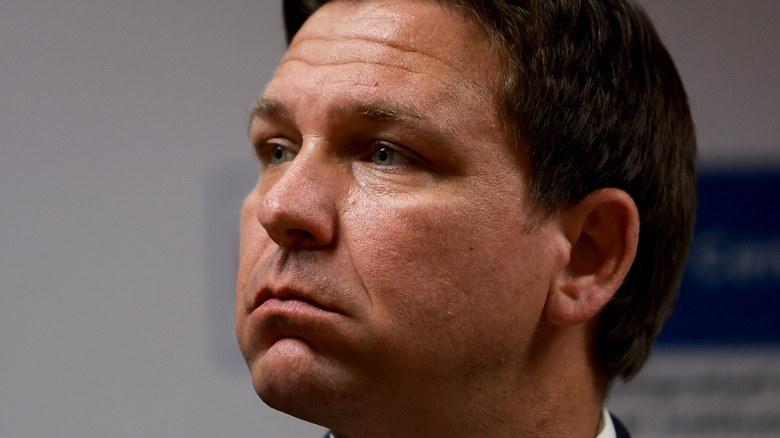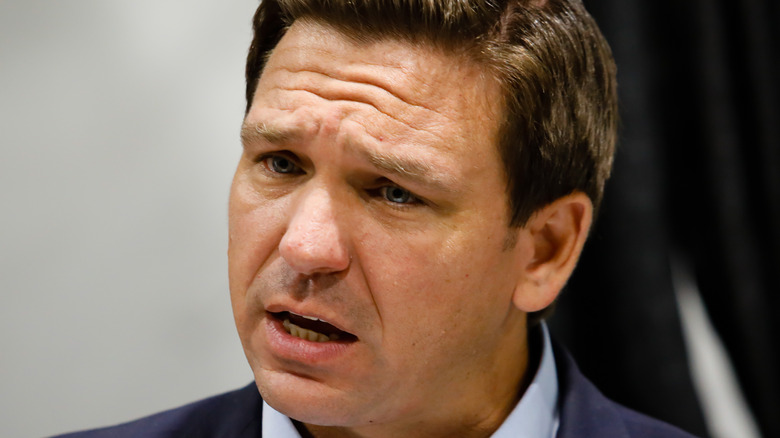Ron DeSantis' Sketchy Side Revealed
It doesn't seem like too long ago that Florida Gov. Ron DeSantis became one of the most obsequious congressional supporters of former president Donald Trump, back when he represented Trump's state in Congress. Today, some Republicans view DeSantis as a potential rival in Trump's bid to regain the White House. It's an unusual set of circumstances, considering both men benefited from reciprocal dealings, especially after Trump — recognizing that DeSantis had his back while he occupied 1600 Pennsylvania Avenue — quickly endorsed DeSantis' run for governor. However, should DeSantis officially throw his hat into the ring to vie for the nation's top office, and become a Trump electoral rival, it's a sure bet that all that quid pro quo will vanish into the ether.
Republicans tired of the "rigged election" laments of their ex-Commander-In-Chief may see DeSantis as someone far more reserved than the unfiltered Trump, and with several more years of experience in public office, too. On contentious issues, however, the two share the same side of the coin, favoring gun ownership and anti-abortion legislation while deploring LGBTQ rights and reactive measures combatting the COVID-19 pandemic. But while DeSantis' supporters dub him "Trump with brains" and "Trump without the baggage" (per Insider), the Florida governor does have some shade dimming the shiny halo that would potentially illuminate the path to renewed Republican prosperity. The sketchy side of DeSantis is certainly worth exploring.
Ron DeSantis has a murky military record
Born to blue-collar parents and holding degrees from Yale and Harvard, native Floridian Ron DeSantis' life comes across as American as apple pie. He frequently highlights his six years of active duty service that began in 2004, as embellished in his "Top Gun" video campaign. That said, DeSantis was never a fighter pilot, but started as a Judge Advocate General with the U.S. Navy while earning a Harvard law degree. Full-time tenure saw him working at the terrorist detention center in Guantánamo Bay before landing a Navy SEAL advisor job in Iraq. Guantánamo in particular piqued the curiosity of the Florida Phoenix, which in 2018 finagled 42 pages of Navy records, much of them redacted, revealing DeSantis was a prosecutor and what the brass called a Joint Task Force Guantánamo "scheduler/administrative officer."
Although the Navy never disclosed details of that post, one Yemeni Guantánamo prisoner, Mansoor Adayfi — who was previously kidnapped and sold to U.S. captors while in Afghanistan — recalled what DeSantis was like at the facility. During a hunger strike involving Adayfi, DeSantis allegedly had military personnel force-feed containers of Ensure through the captives' noses. "Ron DeSantis was there watching us," Adayfi alleged on "Eyes Left" (which classifies itself on Instagram as "a socialist, anti-war military podcast hosted by veterans"). "We were crying, screaming. We were tied to the feeding chair. And that guy, he was watching that. He was laughing, basically." For his part, DeSantis has never disclosed his functions at Gitmo.
He was further to the right than most Republicans
After leaving the Navy, Ron DeSantis turned to politics, winning a House of Representatives seat in 2012. Almost immediately, he showed his Republican stripes by calling out President Barack Obama's foot-dragging on such issues as the Affordable Care Act and the deportation of "non-criminal illegal immigrants." Said DeSantis in 2014 (per The Hill), "President Obama has not only failed to uphold several of our nation's laws, he has vowed to continue to do so in order to enact his unpopular agenda." Still, DeSantis felt his far-right perspectives didn't jibe those of his more moderate peers, prompting fellow Floridian Republican House member David Jolly to call him "a bit of an odd duck" (per CNN).
DeSantis took heat from colleagues when he opposed $9.7 billion in financial relief to Hurricane Sandy victims in the northeastern part of the U.S. in 2013 (although he approved a $36.5 billion package to benefit Floridians experiencing similar hardships four years later). But DeSantis found camaraderie with other like-minded Republicans in Congress by co-founding the Freedom Caucus in 2015 to quash legislation deemed too centrist. Months later, the group grew large enough to attack its own Republican majority and turf House Speaker and fellow Republican John Boehner, with whom they disagreed over Planned Parenthood funding. A couple years after resigning, Boehner questioned whether the enclave DeSantis helped start was in the best interests of the American people when he told Politico, "They're anarchists. They want total chaos."
Ron DeSantis avidly supported Donald Trump
There's little doubt that DeSantis was at odds with the Republican Party, but then, the Floridian never fancied himself as being too intertwined with that political fabric. "Too many of them have been really co-opted by the establishment system in Washington," said DeSantis about his GOP colleagues in a televised interview (via CNN). "I think I'm somebody who's coming as an outsider. I'm looking to change the system." Another "outsider" with similar aspirations was presidential candidate Donald Trump, who appeared to be preaching to the same reactionary choir. In 2016, Trump won partly because he also garnered support from disenfranchised followers when he railed against the Republican establishment, basically using the same playbook scripted by the Caucus.
DeSantis, for his part, threw his support behind the former president, even introducing an amendment to stop an investigation by special counsel Robert Mueller surrounding allegations that Trump colluded with Russia to win the federal election. "[The probe] didn't identify a crime to be investigated and practically invites a fishing expedition," said DeSantis (per Politico), adding, "Congress should use its spending power to clarify the scope and limit the duration of this investigation." The action did not go unnoticed by Trump, who in 2017 tweeted his support for DeSantis' bid to become Florida's next governor. "Congressman DeSantis is a brilliant young leader ... who would make a GREAT Governor of Florida. He loves our Country and is a true FIGHTER!"
He took liberties with Florida's constitution
In 2018, Ron DeSantis handily won the election to become governor of Florida, and it wasn't long before he placed his own brand of conservatism on the office. The following year, DeSantis signed the controversial HB 5 bill into law, designed to curtail lobbyists and the public from including proposed amendments on ballots. Supporters praised the measure for challenging minimum wage increases, additional Medicaid funding, and other proposed amendments — a move they thought would limit fraudulent proposals and influencers outside Florida. Others deplored the law. "This isn't about the fear of petition fraud," declared an editorial in the Orlando Sentinel. "It's about lawmakers attempting to weaken the power of people to change the constitution."
Unchallenged, DeSantis appointed four right-leaning judges to the Florida Supreme Court, including Renatha Francis, who previously didn't meet constitutional requirements to occupy the post. State Rep. Geraldine Thompson said she was disturbed over the appointment, telling Politico in 2022, "Floridians lack confidence in the courts because they see that people are being appointed based on a political agenda rather than knowledge of the law and fitness."
That same year, DeSantis fired Hillsborough County State Attorney Andrew Warren (who said he wouldn't enforce a recently-passed anti-abortion law), on grounds of "incompetence and willful defiance of his duties" (per CBS News). Warren sued, and while the presiding judge noted that DeSantis was in violation of the First Amendment, the attorney couldn't be reinstated since the suspension was based on his conduct as opposed to his speech.
Ron DeSantis assumed a reckless stance on COVID-19
Florida Gov. Ron DeSantis let his freedom flag fly during the pandemic, but at what price? In 2020, Florida trailed other states in imposing shutdowns and quarantine measures, and was the first to reverse the precautions, resulting in the largest number of infected cases in the U.S. that summer. DeSantis told the conservative National Review that he imposed restrictions on nursing homes and hospitals but kept businesses open and allowed counties to use their own discretion regarding the virus. "The epidemic is not going to affect this state uniformly, and what's appropriate in Miami and Broward may not be appropriate for Jacksonville or the Panhandle," said DeSantis.
The laissez-faire approach was key to DeSantis wanting to move the Republican National Convention from Charlotte, N.C. to Jacksonville in August that year (it later moved to an online presentation). When asked about the crowd this event would draw, DeSantis told "Fox & Friends" that state officials would examine COVID precautions, "but to just rule out a convention at this stage, I think, is a mistake."
DeSantis later threatened to cut off funding to public schools that enforced masking, and sought bans on mandating masks and vaccines, to avoid turning Florida into a "biomedical security state" (per Fox News). In the end, DeSantis thought his actions were worth it. "I kept this state open and I kept the state free, and we now have the biggest budget surplus in the history of Florida," he said in a debate before the 2022 gubernatorial election (per CNN), which he won.
He took on big tech over deplatforming
Throughout much of his political career, Ron DeSantis has proclaimed he's a big booster of freedom. But it doesn't take long for those who seriously follow current events to discover an agenda behind that stance. The Florida government's 2021 passage of the Social Media Platforms bill, designed to go after social media companies banning politicians from their platforms, came across as a boon for free speech during the cancel culture frenzy.
But it hardly seemed coincidental that the bill's passage occurred months after Twitter deplatformed former president Donald Trump for his Capitol Hill riot comments. Deftly avoiding any mention of Trump's predicament as a motive, DeSantis claimed, "We took action to ensure that 'We the People,' real Floridians across the Sunshine State, are guaranteed protection against the Silicon Valley elites" (per The Guardian).
Ironically, one Floridian who didn't benefit from the legislation was ill-fated Congressional candidate and former state health department employee Rebekah Jones, who publicly claimed she was instructed by her superiors to fudge COVID stats to make results look more favorable in the wake of Florida's measures (or lack thereof). She was punted off Twitter after spamming a story the Miami Herald did on her perspective. A statement from the governor's office supported her deplatforming, calling the former employee the "Typhoid Mary of COVID-19 disinformation" (per Reason). Arrested in 2021 for using a government computer as a means of "criticizing DeSantis' handling of the pandemic," Jones pled guilty to hacking charges the following year, WUSF reported.
Ron DeSantis put his foot down on public dissent
"We will never surrender to the woke mob," Ron DeSantis declared (via Politico) after winning his second term as Florida's governor. "Florida is where woke goes to die." Likely one validation of that statement was an anti-riot law (the "Combating Public Disorder Act") that foisted huge penalties on rallies and assemblies that might get out of hand. Introduced three months after the January 6 Capitol Hill insurrection in Washington, D.C. in 2021, legislators passed the law, presumably to mitigate the likelihood of a similar situation erupting in Florida.
But DeSantis' remedy didn't even address the insurrection — which several pundits state was triggered by his ally Donald Trump — as the law's motive. Instead, he focused on the Black Lives Matter protests across the U.S., which were organized against police killing Black Americans. "Not only is this racist at its core, but it's also a reaction to what occurred over the summer after the death of George Floyd," Democratic Sen. Shevrin Jones said to the Associated Press.
Critics, including the Tampa Bay Times, said such legislation violated constitutional provisions, including the right to assembly. According to the civil rights groups who sued the state over the law, the legislation was vague and let "police officers decide in every instance what constitutes a riot and who can be arrested" (per ABC News). A District Court judge blocked the law a few months later; a temporary injunction against the legislation still exists at this writing.
A publicity stunt highlighted his stance on immigration
In September 2022, Gov. Ron DeSantis made global headlines for flying 48 migrants to Martha's Vineyard in Massachusetts to rile Democrat-leaning New Englanders lenient on immigration reform. The governor claimed the human cargo transport was part of a $12 million budgetary package to rid Florida of unauthorized migrants. "We're going to spend every penny of that to make sure that we're protecting the people of the state of Florida," he said (per ABC News).
But the migrants, seeking political asylum in the U.S. after fleeing violent uprisings in their native Venezuela, weren't taken from Florida, but a shelter in San Antonio, Texas. Suspiciously, the source of anti-migrant funding was interest from federal monies earmarked towards fighting the pandemic. Then there's the cushy relationship between the Florida government and Vertol Systems, which supplied the planes for the Martha's Vineyard junket. Vertol frequently does business with Florida Republicans, and previously enjoyed legal representation from Florida Congressman and Republican Matt Gaetz.
The U.S. Department of the Treasury has requested an investigation into the legalities of shifting COVID relief funds into another initiative. Meanwhile, several lawyers are representing the migrants and suing DeSantis on grounds that they were promised relocation to areas with amenities like jobs and housing, which did not exist upon arrival in Massachusetts. "You don't treat other fellow human beings like this," said Ron Sullivan, one of the attorneys, to WGBH. "It's just wrong morally, it's wrong constitutionally, and they have to stop it."
Ron DeSantis was accused of whitewashing education
It's no secret that Gov. Ron DeSantis is bullish on education, especially with what he wants to be removed from curricula. So it was hardly surprising when he introduced the "Stop W.O.K.E. Act," designed to ban the teaching of critical race theory in schools. W.O.K.E. was an acronym for "Wrongs To Our Kids and Employees," but the verbiage was clear to detractors that DeSantis was hell-bent on removing any form of leftist thought from making its way into the classroom, from diversity training to inclusion programs. But DeSantis had already begun his attempts to gate-keep the teaching of American history earlier in 2021, with a prior anti-CRT rule. "It's an effort to whitewash, cover up, and candy coat history," said Ben Frazier, head of an education empowerment organization called the Northside Coalition of Jacksonville, to the Orlando Sentinel.
In 2022, DeSantis continued his search-and-destroy message by rolling out the "Parental Rights in Education" bill, known more broadly as "Don't Say Gay." This legislation prevents educators from talking about gender and sexual orientation in school. In 2023, DeSantis stacked a liberal college with conservative board members keen on converting it into a private Christian school. He also prohibited an AP African American studies course from being taught in high schools on grounds that it "lacks educational value" (per The Guardian). The irony of DeSantis, who co-founded the Freedom Caucus in Congress and wound up imposing coercive measures on Florida education, wasn't lost on some pundits. "You can't run around being like 'I'm the pro-free speech guy' and then be banning books and banning entire courses," said "Breaking Points" co-host Krystal Ball.
He pushed for more gun-owning rights
Ron DeSantis has a rather spotty record when it comes to First Amendment rights in Florida. But on the Second Amendment, he'll break out the Smith and Wessons to show his support. In short, DeSantis has been a barrel-blazing opponent of gun control, especially when he declared Floridians would soon have the right to open-carry their firearms without the need for permits. Some opponents believe such deregulation could be dangerous to the public. "To take the safeguards of the permitting process away is asking for trouble," said Patricia Brigham, who heads the lobby group Prevent Gun Violence Florida, to the Miami New Times. "If you're going to be carrying a concealed weapon in public, I think the firearms training is essential."
DeSantis has also been pushing to amend "Stand Your Ground" laws to allow citizens to use force (including lethal methods) against looters, arsonists, and even mischief-makers. One Democrat, Florida Senator Randolph Bracy, not only countered that such an amendment would spur more racist acts; he also accused DeSantis of a more personal motive. "DeSantis is treating the law as a playbook for his next election, which is reckless and irresponsible," Bracy told NBC News. There's another motive, in that DeSantis has received campaign monies from the National Rifle Association.
Ron DeSantis took the lead in banning abortions
When the Supreme Court reversed Roe v. Wade, the ruling gave states the right to ban abortions. With Gov. Ron DeSantis at the helm, Florida had already imposed restrictions on abortion. Proudly signing an act on March 4, 2022, at a Kissimmee-based evangelical church, DeSantis made sure the law included a stipulation that abortions could not be performed beyond 15 weeks after conception. The Termination of Pregnancies statute includes severe penalties for doctors or patients who violate the law, and it affects officials who fail to report an abortion. Additionally, women impregnated through sexual assault or incest are not exempt. "We're here today to defend those who can't defend themselves," said DeSantis (per Tallahassee Democrat) about the statute, which passed despite polls revealing that more than half of Floridians in a sample were against abortion bans.
The signing ceremony hardly impressed President Joe Biden. "Last night, the Republican-controlled Florida legislature passed a dangerous bill that will severely restrict women's access to reproductive health care," Biden tweeted. "My Administration will not stand for the continued erosion of women's constitutional rights." A few months later, activists including the American Civil Liberties Union of Florida sued the state on grounds that the law would "prevent Floridians from exercising their fundamental constitutional right to decide whether to have an abortion prior to viability..." (per Politico).
If you or anyone you know has been a victim of sexual assault, help is available. Visit the Rape, Abuse & Incest National Network website or contact RAINN's National Helpline at 1-800-656-HOPE (4673).
He challenged LGBTQ rights
There doesn't seem to be anything non-binary about Ron DeSantis. When it comes to issues regarding gender ambiguity, identity, and orientation, the Florida governor would rather face two options: for, or against. Not surprisingly, the politician leans to the latter, as evidenced by his legislation nicknamed "Don't Say Gay" in 2022. It not only kiboshed teachings concerning gender in kindergarten through third grade — the legislature also allowed students' parents the freedom to sue a school district where there was evidence of gender identity or sexual orientation being discussed. Eventually, with prompting from upset fans and critics, the movers and shakers of Orlando's Disney World decried the DeSantis measures as anti-LGBTQ. Soon thereafter, DeSantis eliminated Disney World's special district status and with it all the tax benefits the amusement site once enjoyed.
DeSantis also locked horns with the federal government when he pushed to eliminate Medicaid coverage concerning sexual characteristic procedures including hormones, puberty blockers, and gender-altering surgery, while Florida's health department wanted to stop treatment of minors regarding any gender-transition care. He also used the first day of Pride Month in 2021 to make it illegal for transgender girls to participate in female sports in schools. "We are going to go based off biology, not based off ideology when we are doing sports," said DeSantis (per Reuters). That DeSantis was throwing his weight around on the LGBTQ subject was disconcerting to pundits. "His anti-LGBTQ agenda is now moving into a new heightened state of criminalization, one which also demonstrates how DeSantis wields power," wrote The New Republic in 2022.

